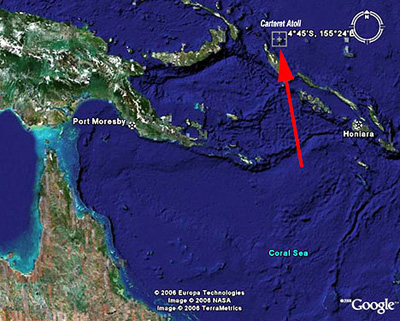Ben Jarvis
PORT MORESBY: Carteret Islanders have been called the world's first climate refugees. Their homeland, a remote chain of six small islands in the South Pacific, is fast losing ground to rising sea levels.
The 1000 or so people whose families have lived there for dozens of generations have made an agonizing decision to relocate their entire community before it disappears beneath the rising waves.
In June 2008, filmmakers Jennifer Redfearn and Tim Metzger learned of the refugees' plight and headed to the Carteret Islands, video equipment in tow, hoping to share their story with the world. Their documentary, Sun Come Up, was released last year.
On Sunday night, it is up for an Academy Award in the best documentary short category. Redfearn has a background in environment studies, a journalism degree from Columbia University, and had worked on several television series, but Sun Come Up is her debut film.
Redfearn has a background in environment studies, a journalism degree from Columbia University, and had worked on several television series, but Sun Come Up is her debut film.
She first heard about the Carteret Islanders from a forwarded humanitarian e-mail alert; after reading about them, she could focus on little else. Three months after receiving the e-mail, Redfearn and filmmaking partner Metzger landed in the South Pacific and started shooting.
They weren't sure what to expect, but they had been encouraged to come by Ursula Rakova, head of the Carteret relocation program.
'Sharing their stories'
They were well received, and the islanders were, according to Redfearn, "really generous with their time and sharing their stories."
They were well aware of why their islands were shrinking and the global issues behind the local changes.
"When they first started to witness changes, they didn't know why," Redfearn explains. "But Ursula was born on the Carteret Islands and has traveled abroad to get her education so she has become aware of what's happening internationally. She taught the community about the science."
The filmmakers didn't find the islanders to be helpless or angry.
"More than anything else," Redfearn says, "there's a great feeling of uncertainty."
The island's elders would prefer to stay, despite the risks. They grew up there, spent their whole lives there, and "have no interest in moving and adapting to a new society or culture". But the younger generations are looking at things differently.
"They're looking ahead at how to rebuild their community somewhere else."
Video short
With dozens of hours of footage, Redfearn and Metzger returned from the Carterets and cut a quick video short of the story, then entered the Media That Matters Film Festival. The film won the Jury Award, but, perhaps more importantly, that's where Redfearn and Metzger found a perfect partner for the project in Abigail Disney, great niece of Walt Disney and an award-winning documentary filmmaker in her own right.
The film won the Jury Award, but, perhaps more importantly, that's where Redfearn and Metzger found a perfect partner for the project in Abigail Disney, great niece of Walt Disney and an award-winning documentary filmmaker in her own right.
Disney was a judge for the festival and loved the short.
"It had a very human take on a problem that tends to be primarily intellectual for most people," she says.
Disney’s filmmaking credits include the acclaimed Pray the Devil Back to Hell. She signed on as executive producer for Sun Come Up.
"I'm pretty much only concerned with films that have a social message," Disney told me.
"But I'm not interested in films that are primarily messages of doom. I'm interested in films that show ways that people will thrive through difficult situations, and how they very often bring some surprising humanity and creativity and kindness in trying times."
Story of hope
Even the title of Redfearn’s film title reflects that optimism. It comes from a phrase of local dialect Tok Pisin, san ka map, which means sunrise.
"It seemed fitting, as it's a tragic story, but also one of hope and resilience," Redfearn said.
With Disney on board, the filmmakers needed to get back to the islands to film footage for a longer documentary. To raise money, they turned to the crowd-sourced funding platform Kickstarter. (Full disclosure: I contributed a few of the more than $14,000 dollars they raised through Kickstarter.)
When they returned to the South Pacific, the relocation plans were moving fast. The Carteret Islanders’ future home is Bougainville, a much larger and mountainous island some 70 km acros the open ocean from the Carterets.
Bougainville already has some of its own problems, including a 10-year civil war in the 1990s.
"We followed a group of young people who went over to Bougainville," Redfearn explains, "traveling from village to village to build relationships and trust, and figure out where exactly to relocate".
While the reception to the prospective refugees in Bougainville is "mixed," some profound instances of generosity really stand out.
At one meeting captured in the film, a local Bougainville landowner stands up and tells the young islanders: "Your story has moved me to tears. I want to give you some land."
The young men built some houses and started growing crops. They are, still today, figuring out where and how exactly the rest of the 1000-plus Carteret Islanders will migrate their community and culture to Bougainville.
"It's poignant. It's heartbreaking," says Disney. "Because these people will never go back to their community. Their entire civilization has been uprooted, through no fault of their own. But they conquer it with such grace."
As the Oscars approach, the filmmakers are hoping to harness their Academy-driven buzz for good and are asking supporters and fans to use their Oscar parties to raise money for a Carteret Islanders relocation program. All donations will go directly to the construction of new homes.
"These communities bear the brunt of climate change," Redfearn says, "even though they’ve done next to nothing to contribute to it. They have a right to survive, and a right to a home."

Films that focus on the planet:
The environment is big at the Oscars this year. Three other Academy Award-nominated documentaries have environmental themes:
Gasland
Gasland takes a critical look at the natural gas extraction industry - particularly the highly controversial practice of hydraulic fracturing. The practice has been blamed for polluting local water supplies, making neighbors sick, and killing vegetation and wildlife.
The filmmaker, Josh Fox, was approached by companies seeking rights to drill on his land, and the film convincingly portrays fracking as a severe threat to public health and safety. Watch the trailer.
Waste Land
On the outskirts of Rio de Janiero, in the world’s largest garbage dump, a community of catadores, or "scavengers," spends their lives picking through the refuse for recyclable, reusable, and even edible materials.
Waste Land follows Brooklyn-based artist Vik Muniz as he travels to his native Brazil and connects with the trash-pickers and helps them create striking, vivid images of themselves out of the garbage that is their livelihood.
The images show "both the dignity and despair of the catadores as they begin to re-imagine their lives." Watch the trailer.
The Warriors of Qiugang
This "David vs. Goliath" story follows poor villagers in China's industrial heartland who stand up against runaway pollution.
The Warriors of Qiugang is plagued by three major industrial sites that "churned out chemicals, pesticides, and dyes, turning the local river black, killing fish and wildlife, and filling the air with foul fumes that burned residents’ eyes and throats and sickened children."
The Warriors of Qiugang was co-produced by Yale Environment360. - Onearth.org/Pacific Media Watch
Ben Jervey is Onearth.org's community editor.
How Sun Come Up missed out at the Oscars - see Cafe Pacific



